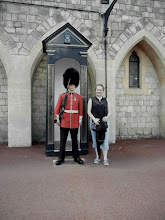 |
| My signed copy of Mistress of Rome by Kate Quinn. |
My mom has known about my love for Kate Quinn's books for years, and used this to her advantage to get me to join her neighborhood book club (remember, I'm already in her other book club, which she got me to join because they read one of her favorite books). When the neighborhood book club chose The Alice Network for their next book, she knew it would be incredibly difficult for me to refuse to go. Unfortunately, she was right, isn't that the worst? I'd been wanting to read The Alice Network for a while, but I hadn't gotten around to it yet, but now I was out of excuses. With enthusiasm, I jumped right into the compelling and powerful tale of redemption and women fighting for what's right.
The Alice Network is a dual timeline story, but it's different from other dual timeline books. Instead, some of the same characters appear in both timeline, particularly Eve Gardiner. In one timeline, Eve is a British woman during World War I. In her attempt to help fight against the Germans, she agrees to join the Alice Network, a collection of spies scattered across Western Europe gathering information about the Germans to pass along to British intelligence. It follows her powerful and frightening journey as she tries to hide in plan site as a waitress at a local cafe in German-occupied France where German soldier frequent. The second timeline takes place shortly after World War II. Charlie St. Clair is an American girl traveling through Europe to Switzerland to take care of her "Little Problem". Charlie, however, has ulterior motives, as she is in Europe to find out what happened to her beloved cousin, Rose, during the turmoil that was World War II. The only clue she has is Eve's name, which is how the two timeline merge into one eventually. Eve is forced to face the demons of her past as a spy while simultaneously trying to help Charlie find her cousin and reconcile with the damage done to Europe during World War II.
As always, it's difficult to talk about books I've read without spoilers. If you haven't read the book or want to avoid spoilers in case you do end up reading the book in the future, this is where I leave you. If you want to know my thoughts about what happened or want to see the discussion questions I created for book club, please feel free to keep reading.
Now, about Alice's death. I knew she was going to die, there was no way she could survive the war. On the other hand, I thought that it was absolutely awful for her to die the way she did. It was a completely preventable death. I really did think she was going to die by a firing squad. I was also caught off guard by how Eve broke her fingers. I definitely didn't imagine Rene doing the deed, I never pictured him as one to get his hands dirty, I always imagined that the Germans did it to her. Either way, I found that chapter absolutely brutal and incredibly difficult to read. Part of me wanted to skip it, but I powered through and finished it. The entire time, I was uncomfortable and only wanted to get it over with, much like Eve probably did.
While doing a little bit of research for this blog post, I came across something that completely threw my perceptions of the book into a tailspin: Alice Dubois was a real person! I know, I'm just as surprised as you are.
 |
| Photograph of Alice Dubois courtesy of the Western Front Society |
Update: Kate Quinn did get back to me about what she would change about Alice's character and what happened to her if she hadn't been a real person. She said she probably would have changed her fate a little. You can see our brief Twitter exchange below.
 |
| My Twitter conversation with Kate Quinn about Alice Dubois' fate in the end of The Alice Network. |
- Would Eve and Charlie's strong personalities stand out so much in the 21st century?
- Do you think Eve succeeded so much as a spy because she had the skills or because, as a woman, she had more to prove and therefore worked harder?
- Do you think Eve's stutter contributed to her desire for perfection as a spy?
- Why do you think Charlie didn't tell Eve she was pregnant?
- When Eve says, "It's the wicked who go on merrily" living, was she talking about herself or Rene?
- How did Charlie's pregnancy contribute to the story?
- Why do you think Eve had such a sudden change of heart about helping Charlie after Charlie's mother showed up?
- Do you think Charlie would have made a good spy?
- Charlie's mom told her, "Get B's at Bennington until you can hook a nice young lawyer." What does that tell you about Charlie and her mother's different priorities?
- In what ways was this a story of redemption?
- Do you think Alice's death was an accident or intentional?
- How did Eve contribute to Rene becoming more ruthless from World War I to World War II?
- Was Rene really a collaborator or was he a capitalist trying to survive the war?
- How does the fact that Alice Dubois was a real person change your perception of the story?












0 comments:
Post a Comment